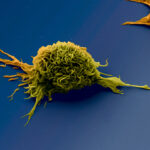Link to Pubmed [PMID] – 15592842
Springer Semin Immunopathol 2005 Jan; 26(3): 257-71
Dendritic cells (DCs) have the unique ability to capture cellular tissue antigens, and to present them on MHC class I molecules to antigen-specific CD8(+) T lymphocytes after migration to the draining lymph nodes. This process, called “cross presentation” can lead either to the tolerization or activation of antigen-specific CD8(+) T cells. Antigen capture is believed to occur by phagocytosis of antigen-bearing dead cells. Recent studies suggest that the antigen transferred from the phagocytosed cell to the DC during cross presentation is a proteasome substrate, rather than a proteasomal degradation product. In most cases, the formation of the peptide-MHC class I complexes in DCs requires the export of protein antigens from phagosomes to the cytosol, where they undergo proteasomal degradation. The resulting peptides are then translocated by TAP to the lumen of a cross presentation-loading compartment, for association to MHC class I under the control of chaperones and oxido-reductases. This loading compartment may be either the endoplasmic reticulum (ER) or a mix phagosome-ER compartment. MHC class I egress from the loading compartment to cell surface remains to be analyzed.

